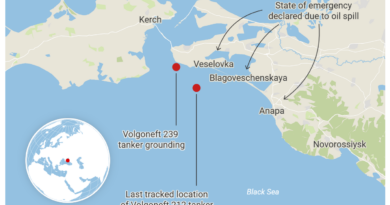Krasnodar Declares Regional Emergency as Black Sea Oil Spill Cleanup Stalls

Authorities in southern Russia’s Krasnodar region have declared a regionwide state of emergency as cleanup efforts for an oil spill along the Black Sea coast stall.
The spill occurred on Dec. 15 after two Russian-flagged oil tankers were damaged during a storm, releasing thousands of tons of heavy fuel oil — known as mazut — into the Black Sea. Emergency officials reported Monday that the spill had polluted approximately 55 kilometers (34 miles) of coastline.
Authorities in affected coastal communities, including the resort city of Anapa, had previously declared local emergencies to address the growing layers of oil washing up on beaches. However, residents and volunteers argued that the spill warranted a national-level emergency, which would unlock additional resources for the cleanup.
On Tuesday, Russia’s top investigator, Alexander Bastrykin, ordered law enforcement authorities to launch a criminal probe into alleged “failures” in addressing the cleanup.
“Unfortunately, the discharge of oil products onto the shores of Anapa and the Temryuk district has dragged on and shows no signs of stopping,” Krasnodar region Governor Veniamin Kondratyev wrote on Telegram as he announced the regional emergency.
According to Kondratyev, initial expert assessments suggested that most of the oil residue would settle on the seabed, making it easier to collect. However, he noted that warmer temperatures were causing the oil to rise to the surface and wash ashore.
The regional emergency declaration will allow Krasnodar authorities to allocate additional resources, mobilize emergency services and request federal assistance if needed.
At his annual press conference on Thursday, President Vladimir Putin blamed the oil tankers’ captains for the disaster, claiming they ventured out to sea without authorization.
Meanwhile, volunteers and activists have criticized regional authorities for their slow and disorganized response to the environmental crisis. Many volunteers have been forced to fund cleanup efforts independently, purchasing equipment and supplies out of pocket.
A Message from The Moscow Times:
Dear readers,
We are facing unprecedented challenges. Russia’s Prosecutor General’s Office has designated The Moscow Times as an „undesirable“ organization, criminalizing our work and putting our staff at risk of prosecution. This follows our earlier unjust labeling as a „foreign agent.“
These actions are direct attempts to silence independent journalism in Russia. The authorities claim our work „discredits the decisions of the Russian leadership.“ We see things differently: we strive to provide accurate, unbiased reporting on Russia.
We, the journalists of The Moscow Times, refuse to be silenced. But to continue our work, we need your help.
Your support, no matter how small, makes a world of difference. If you can, please support us monthly starting from just $2. It’s quick to set up, and every contribution makes a significant impact.
By supporting The Moscow Times, you’re defending open, independent journalism in the face of repression. Thank you for standing with us.
Continue
Not ready to support today?
Remind me later.
×
Remind me next month
Thank you! Your reminder is set.

